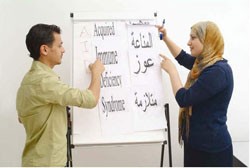
The cornerstone of Family Guidance and Awareness Center is a free hotline, staffed by trained counselors, that receives more than 120 calls a month with questions on law, psychological issues, employment, and other topics. FGAC offers an array of health and legal services, psychological counseling, support for victims of domestic violence, and women and children’s development services, including vocational training.
USAID selected FGAC to participate in Jordan’s first training of trainers for HIV peer educators in 2002. FGAC continued to receive technical assistance to build its capacity to provide HIV/AIDS-related services, and in 2006, FGAC became one of the partner’s local implementing agencies.
The ongoing assistance and funding from USAID allowed FGAC to launch strategic behavioral communications programs on HIV for vulnerable populations. FGAC’s outreach targets taxi drivers, and workers from small businesses and the surrounding qualified industrial zones that employ thousands of migrant workers from countries with significantly higher HIV/AIDS prevalence rates.
FGAC has conducted over 1,485 HIV/AIDS awareness sessions and reached over 17,129 people with its messages. But the numbers do not tell the full story. FGAC president Nadia Bushnaq explained, “Our partnership with USAID … allowed us to expand services from the community to the workplace, where we serve as a vital source of information and provide linkages to local services for people who might otherwise go unserved.”
The work is not easy, but can be very rewarding, says Saed Rgahib, an FGAC peer educator. Saed initially hesitated to join the workplace outreach team after he was beaten by members of a gang he approached with HIV/AIDS messages. But the welcoming response of the workers encouraged him, and he has successfully helped people gain access to voluntary counseling and testing services.







Comment
Make a general inquiry or suggest an improvement.